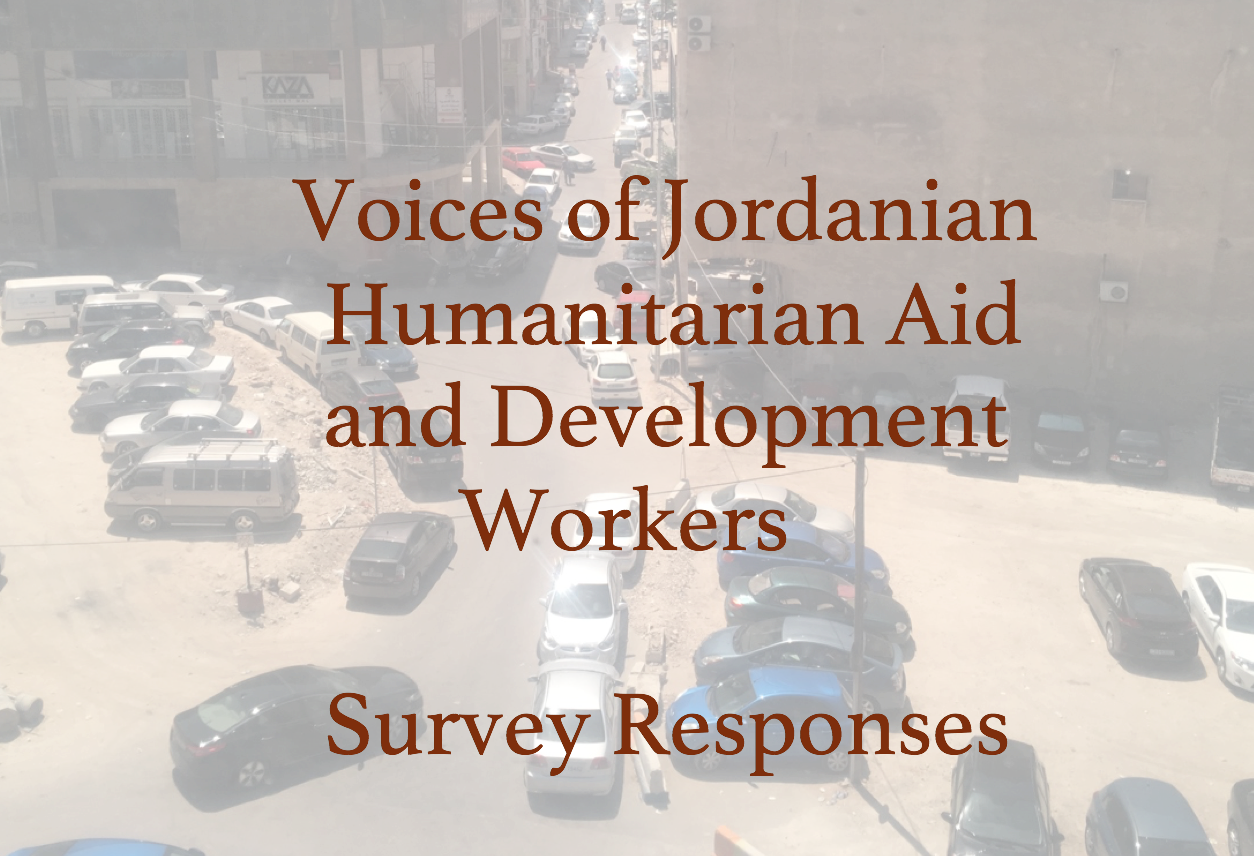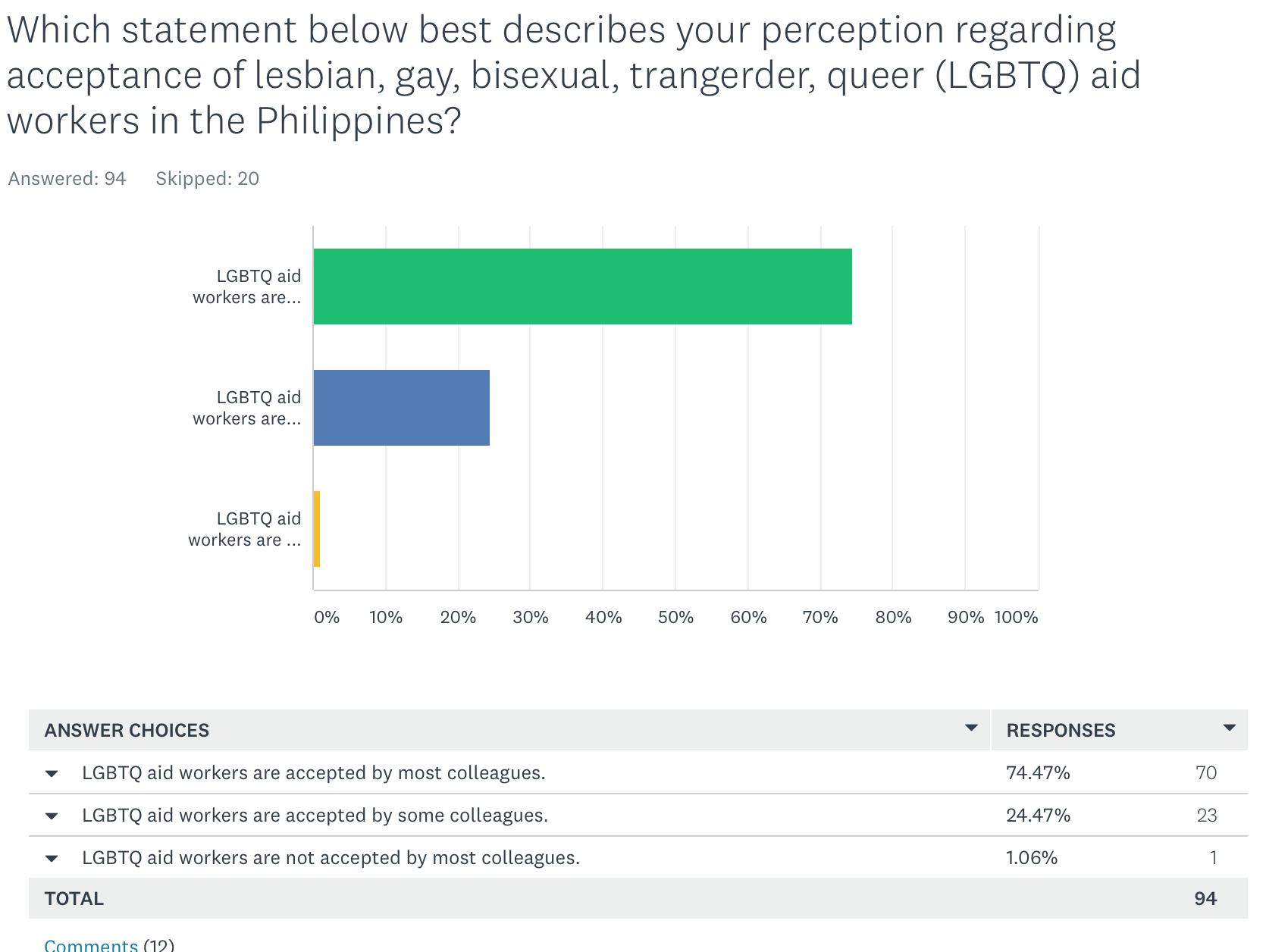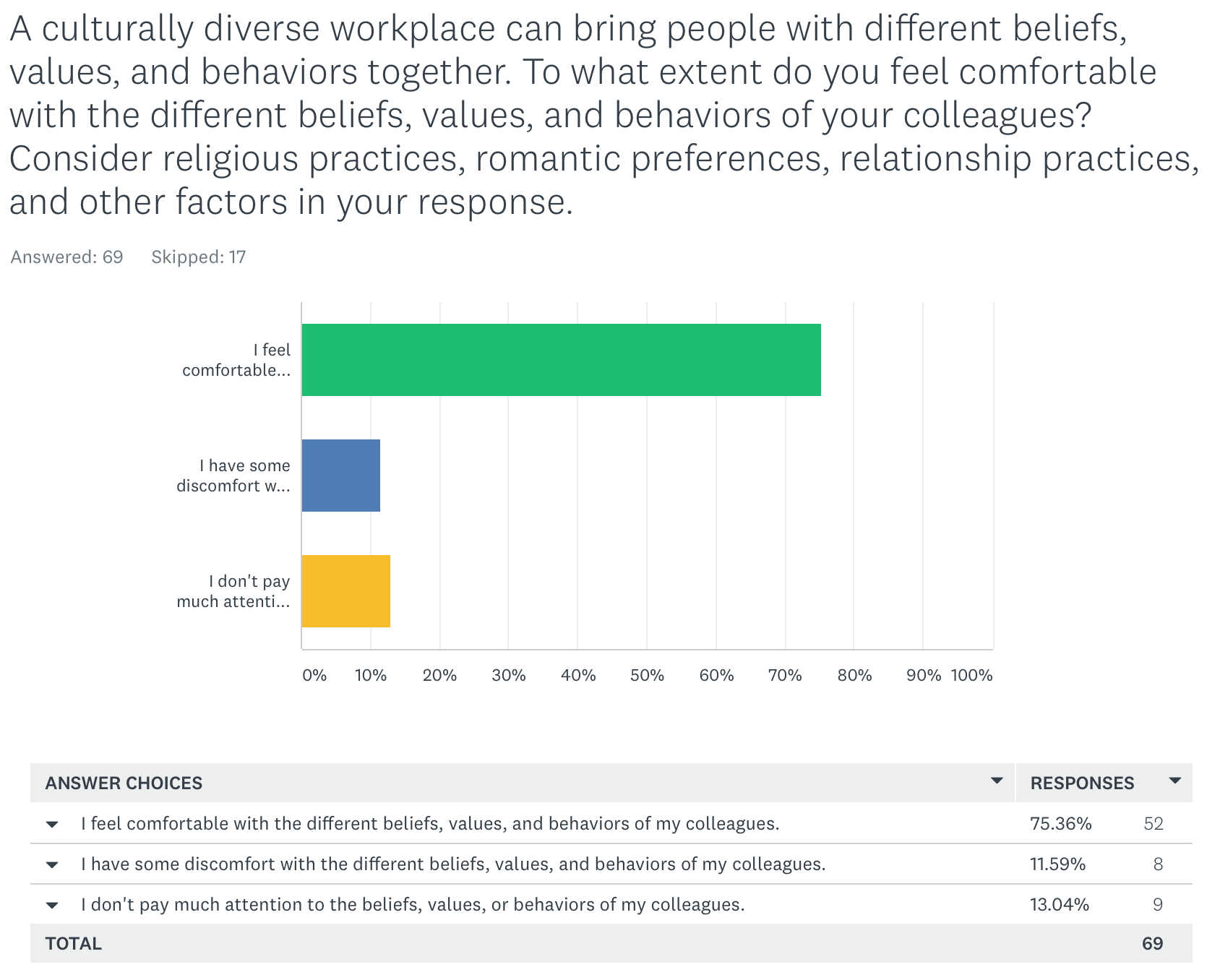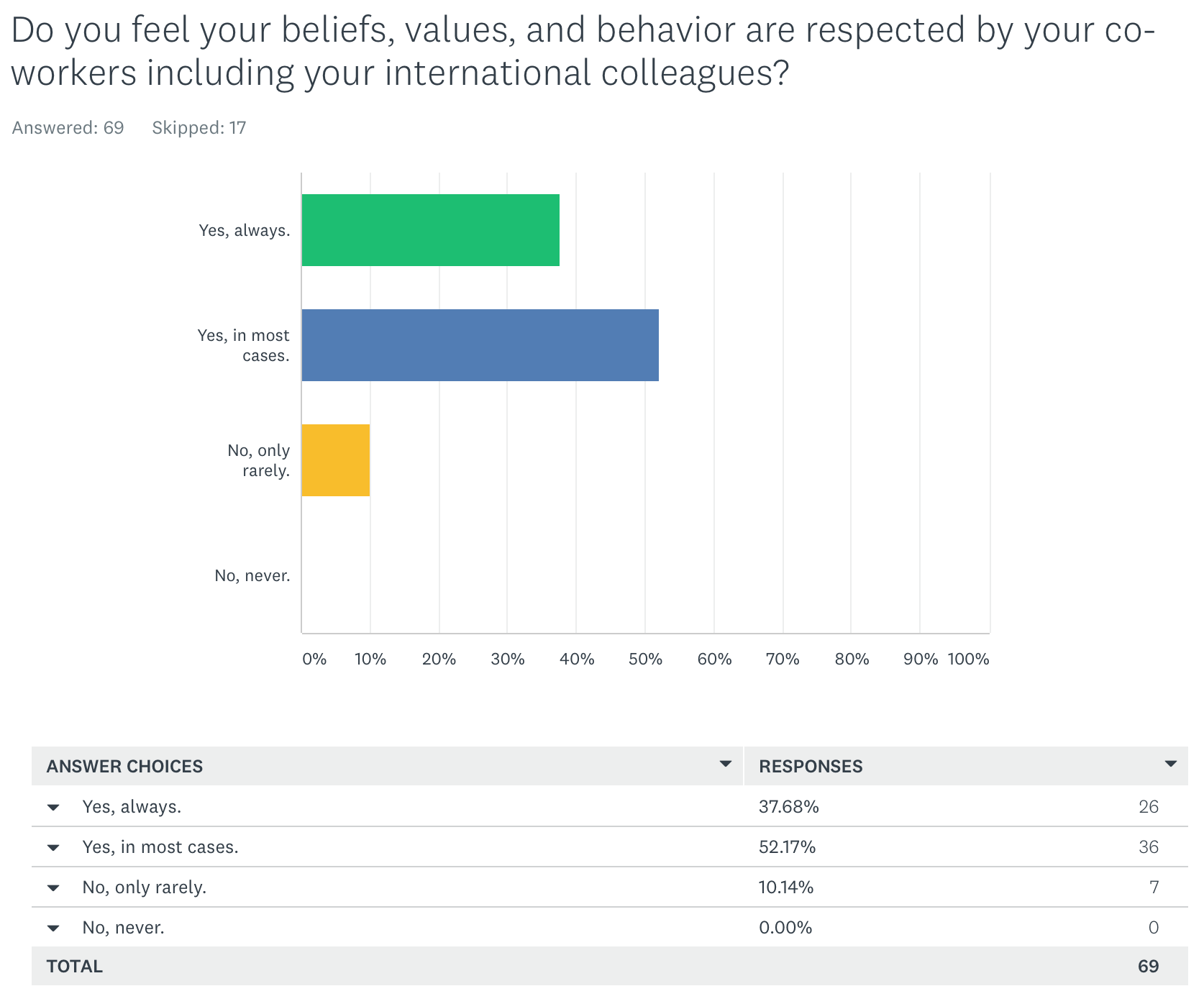The diversity question
More results from the Jordanian humanitarian worker survey.
First, a comment about status, privilege, and being ‘woke’
From the worker perspective, one very important factor determining comfort in the workplace is how accepted one feels concerning their various social statuses. There are many statuses, both ascribed and  achieved (and some a hybrid) that, depending upon the social context, emerge as ‘master statuses’ which can significantly color how one is viewed, responded to, and ultimately either accepted or marginalized both socially and professionally. Among these statuses are gender, age, race/ethnicity, sexual orientation, religion, level of education, and outstanding physical attributes. Adding to the complexity is the fact of intersectionality, the complex and inherent interconnection of power and marginalization that impacts everyone either directly or indirectly.
achieved (and some a hybrid) that, depending upon the social context, emerge as ‘master statuses’ which can significantly color how one is viewed, responded to, and ultimately either accepted or marginalized both socially and professionally. Among these statuses are gender, age, race/ethnicity, sexual orientation, religion, level of education, and outstanding physical attributes. Adding to the complexity is the fact of intersectionality, the complex and inherent interconnection of power and marginalization that impacts everyone either directly or indirectly.
Most of us train ourselves to see beyond the surface (to become ‘woke’), but the reality is that life-long socialization into using specific cultural lenses sometimes can make us unaware of some of the assumptions we are making about ‘the other’. Recognizing, owning and then mindfully checking ones’ ethnocentrisms and various privileges is rarely a ‘one and done’ exercise, but rather a lifetime journey, especially for those -humanitarians, for example- who regularly encounter diversity in its many rich and complicated forms. Those with privilege must constantly be not only willing but ever ready to engage in anti-oppressive practices and encourage same in all our workmates.
On a reflexive -and sociological- note I’ll add that having certain ascribed statuses can make the journey toward ‘wokedome’ longer and harder (but all the more necessary!). As a cis, straight, ‘too male, too pale, and too stale’ person, I embrace that journey daily. It should surprise no one that some of the earliest and strongest voices advocating for social justice and embodying ‘wokeness’ were women of color, all too aware of how their master statuses were at play as they navigated a life of meaning.
To be clear, privileges come in many forms, including (but not limited to) race, class, gender, sexuality, age, and nationality, and this means being from the ‘global North.’ Can privileges amplify each other if, as in my case, a person has multiple privileged statuses? Of course.
Kimberlé Crenshaw coined the term ‘intersectionality’ many years ago to help us understand the “complex, cumulative way in which the effects of multiple forms of discrimination (such as racism, sexism, and classism) combine, overlap, or intersect especially in the experiences of marginalized individuals or groups” (source). Perhaps we need a new word to describe the complex, cumulative way in which the effects of multiple privileges combine, overlap, or intersect and thus amplify the power of these privileges in both individuals and groups.
The evolution of a survey question
One measure of the acceptance of diversity in the workplace is the degree to which those identifying as LGTBQ+ feel comfortable. When generating questions for our 2014 survey that reached mostly expat ‘international’ aid workers (and led to the publication of Aid Worker Voices) , J and I did not include any questions directly relevant to this issue. To fill that gap I put out a separate survey, with this as the main question: “In your opinion how accepting of those who identify as LGBT+ is the aid and development industry?” See here for the post of the LGTBQ+ survey.
When I collaborated with Arbie Baguios on our survey of Filipino aid workers we used this version of the question: “Which statement below best describes your perception regarding acceptance of lesbian, gay, bisexual, trangerder, queer (LGBTQ) aid workers in the Philippines?”
See here for more on the results from the Filipino survey.
The Jordanian version
Early drafts of the Jordanian version of the survey had this exact question, substituting “in Jordan” for “in the Philippines.” After several Jordanians looked at this wording it was suggested that there was a need for revision aimed at making the question more inclusive and also less direct.
We settled on the following: “A culturally diverse workplace can bring people with different beliefs, values, and behaviors together. To what extent do you feel comfortable with the different beliefs, values, and behaviors of your colleagues? Consider religious practices, romantic preferences, relationship practices, and other factors in your response.”
We also decided to add this follow up question, making it a bit more personal: “Do you feel your beliefs, values, and behavior are respected by your co-workers including your international colleagues?”
 The results
The results
While most -75% reported feeling comfortable with the “beliefs, vales, and behaviors” of their colleagues, 13% indicated that they “don’t pay much attention”. In retrospect including this as a response option confused more than clarified the question, allowing for a safe ‘none-response.’ That 12% have “some discomfort with the different beliefs, values, or behaviors of [their] colleagues.” is significant. Given the nature of workplace relationship chemistry, having any significant number of team members feeling uncomfortable impacts the interactional patterns overall.
The comments to this question were mostly positive, many having the theme represented by this older female respondent.
“We have “national” and “international” staff who hold different beliefs, values, etc. They’re none of my bussiness just as mine are none of theirs. We agree on the values that affect and drive our work, our organization’s values, and that’s what matters.”
A second female put it this way,
“As long as everyone is doing their job the best they can, and their beliefs, behaviors and values align with the humanitarian principals (they’re basically decent people), I feel very comfortable regardless of the specificities of their values and beliefs.”
There was only one comment that I would term negative, again made by a female.
“I find that as a female with liberal opinions i always have to keep my beliefs private.”
Do I feel respected by my colleagues?
In response to the second question, again a sizable minority did not feel comfortable, with 10% saying they “rarely’ are respected, with 52% indicating that they felt respected in ‘most’ cases. In a perfect world 100% -as opposed to a weak 38% on this survey- would always feel respected.
Take away thoughts
All workplace managers are tasked with keeping tabs on the overall chemistry of their teams and, as part of that job, making sure that everyone feels accepted and respected. A team that respects each other works more efficiently and, not inconsequentially, reflects the core mission of all humanitarian operations, namely facilitating pathways toward dignity for all.
And now for comic relief
International workers have feelings, just like everyone else, and those feelings need attending to. Some may find this training video useful. I will be using it in my sociology classes soon.
https://www.facebook.com/ajplusenglish/videos/230678020679839/
Please contact me with comments or questions via email.
You can access all of my posts related to Jordanian humanitarian workers here.


 Follow
Follow